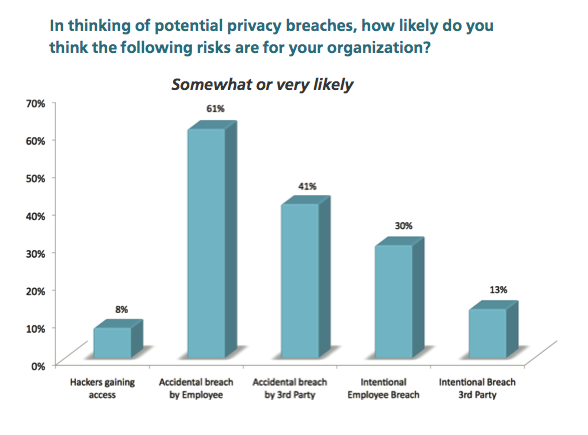April 05, 2011
If data breaches are feared more than hackers, what is the perverse result?
This headline struck my attention:
Data Breaches Feared More than HackersThe majority of compliance professionals feel that their organizations are well or very well prepared to fend off hacker attacks, however, their confidence wanes significantly when assessing other data breach threats. This according to a survey conducted by the Society of Corporate Compliance and Ethics (SCCE) and the Health Care Compliance Association (HCCA).
This mirrored my results in The Market for Silver Bullets, in that the cost of the loss to intangibles and indirects such as reputation and compliance reviews would far outweigh the direct losses to the individuals. Consequently, this would have perverse effects on the treatment of risks.
I didn't really go into what those perverse effects were. Suffice, I thought at the time, to say, security's really screwed up, there is no way you can expect a rational result from this mess. But one thing struck me on reading that heading.
If the indirect effects of the data breach are feared more than the direct effects of the hacker's impacted damages, then there is an easy solution. Simply share the results, and generate a win-win for both. E.g., if the hacker manages to breach, and steal X data sets, he now has two opportunities. He can either exploit the breach set for some gain X*y where y is the average gain per identity, or he can settle with the lead victim.
Because we know that the indirect costs to the victim will far outweigh the direct gain to the attacker, there is an easy settlement. The victim is easily incentivised to pay for the breach to be settled without additional costs. And the attacker gains too as he has less work to do. Negotiation will find a convenient price between the two bounds.
Thus, this state of affairs predicts that the market for silver bullets leads to a market for extortion. Hack citibank, sell them their data back. I have no firm data, but I am comfortable with predicting that the difference is an order of magitude. That is, the costs to the victim are around 10 times the benefit to the attacker. Plenty of room there for a win-win solution.
(For those who are worried about the impact of an illegal contract, it is easy enough to put a silk dress on the pig and sell the breach techniques, with an NDA attached. This of course is the worry behind those breach markets. How close to extortion does it take us? Where do the morals stop and where does the crime start? A topic for another day...)

As a slight footnote, to confirm my prediction of this particular perverse result, I followed the article. Here's the relevant section found on the survey provider's site, two groups called Society of Corporate Compliance and Ethics and Health Care Compliance Association.
Fears of an accidental breach far outweigh fears of an intentional breach. Respondents were asked how likely they felt that data would be released through hacking attacks, intentional breaches by employees and third party vendors, and accidental breaches by employees and vendors. In general the feeling was that accidental breaches were far more likely. Just 8% felt that it was somewhat or very likely a hacker would gain access to the system, When it came to breaches by employees, 61% thought an accidental breach was somewhat or very likely, but just 30% thought the same of an intentional breach. Likewise 41% thought an accidental breach by a third party vendor was somewhat or very likely but only 13% thought an intentional breach was somewhat or very likely.
Unfortunately, no such luck. Right crowd, different story :) Oh well. So markets in extortion won't happen, right?
Posted by iang at April 5, 2011 06:55 PM | TrackBack